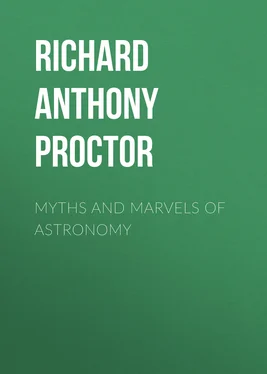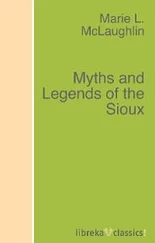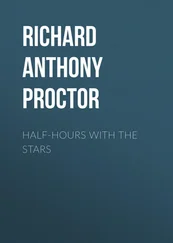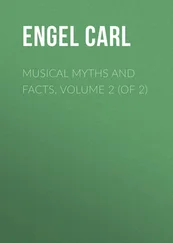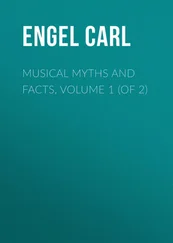Richard A. Proctor - Myths and Marvels of Astronomy
Здесь есть возможность читать онлайн «Richard A. Proctor - Myths and Marvels of Astronomy» — ознакомительный отрывок электронной книги совершенно бесплатно, а после прочтения отрывка купить полную версию. В некоторых случаях можно слушать аудио, скачать через торрент в формате fb2 и присутствует краткое содержание. Жанр: foreign_edu, Физика, на английском языке. Описание произведения, (предисловие) а так же отзывы посетителей доступны на портале библиотеки ЛибКат.
- Название:Myths and Marvels of Astronomy
- Автор:
- Жанр:
- Год:неизвестен
- ISBN:нет данных
- Рейтинг книги:5 / 5. Голосов: 1
-
Избранное:Добавить в избранное
- Отзывы:
-
Ваша оценка:
- 100
- 1
- 2
- 3
- 4
- 5
Myths and Marvels of Astronomy: краткое содержание, описание и аннотация
Предлагаем к чтению аннотацию, описание, краткое содержание или предисловие (зависит от того, что написал сам автор книги «Myths and Marvels of Astronomy»). Если вы не нашли необходимую информацию о книге — напишите в комментариях, мы постараемся отыскать её.
Myths and Marvels of Astronomy — читать онлайн ознакомительный отрывок
Ниже представлен текст книги, разбитый по страницам. Система сохранения места последней прочитанной страницы, позволяет с удобством читать онлайн бесплатно книгу «Myths and Marvels of Astronomy», без необходимости каждый раз заново искать на чём Вы остановились. Поставьте закладку, и сможете в любой момент перейти на страницу, на которой закончили чтение.
Интервал:
Закладка:
But not only have we already decided that the pyramids were not intended solely or chiefly to sub serve the purpose of astronomical observatories, but it is certain that Cheops would not have been personally much interested in any astronomical information which these visitors might be able to communicate. Unless he saw clearly that something was to be gained from the lore of his visitors, he would not have undertaken to erect any astronomical buildings at their suggestion, even if he had cared enough for their knowledge to pay any attention to them whatever. Most probably the reply Cheops would have made to any communications respecting mere astronomy, would have run much in the style of the reply made by the Turkish Cadi, Imaum Ali Zadè to a friend of Layard's who had apparently bored him about double stars and comets: 'Oh my soul! oh my lamb!' said Ali Zadè, 'seek not after the things which concern thee not. Thou camest unto us, and we welcomed thee: go in peace. Of a truth thou hast spoken many words; and there is no harm done, for the speaker is one and the listener is another. After the fashion of thy people thou hast wandered from one place to another until thou art happy and content in none. Listen, oh my son! There is no wisdom equal unto the belief in God! He created the world, and shall we liken ourselves unto Him in seeking to penetrate into the mysteries of His creation? Shall we say, Behold this star spinneth round that star, and this other star with a tail goeth and cometh in so many years! Let it go! He from whose hand it came will guide and direct it. But thou wilt say unto me, Stand aside, oh man, for I am more learned than thou art, and have seen more things. If thou thinkest that thou art in this respect better than I am, thou art welcome. I praise God that I seek not that which I require not. Thou art learned in the things I care not for; and as for that which thou hast seen, I defile it. Will much knowledge create thee a double belly, or wilt thou seek paradise with thine eyes?' Such, omitting the references to the Creator, would probably have been the reply of Cheops to his visitors, had they only had astronomical facts to present him with. Or, in the plenitude of his kingly power, he might have more decisively rejected their teaching by removing their heads.
Конец ознакомительного фрагмента.
Текст предоставлен ООО «ЛитРес».
Прочитайте эту книгу целиком, на ЛитРес.
Безопасно оплатить книгу можно банковской картой Visa, MasterCard, Maestro, со счета мобильного телефона, с платежного терминала, в салоне МТС или Связной, через PayPal, WebMoney, Яндекс.Деньги, QIWI Кошелек, бонусными картами или другим удобным Вам способом.
1
These reflections were suggested to Tacitus by the conduct of Thrasyllus (chief astrologer of the Emperor Tiberius), when his skill was tested by his imperial employer after a manner characteristic of that agreeable monarch. The story runs thus (I follow Whewell's version): 'Those who were brought to Tiberius on any important matter, were admitted to an interview in an apartment situated on a lofty cliff in the island of Capreæ. They reached this place by a narrow path, accompanied by a single freedman of great bodily strength; and on their return, if the emperor had conceived any doubts of their trustworthiness, a single blow buried the secret and its victim in the ocean below. After Thrasyllus had, in this retreat, stated the results of his art as they concerned the emperor, Tiberius asked him whether he had calculated how long he himself had to live. The astrologer examined the aspect of the stars, and while he did this showed hesitation, alarm, increasing terror, and at last declared that "The present hour was for him critical, perhaps fatal." Tiberius embraced him, and told him "he was right in supposing he had been in danger, but that he should escape it," and made him henceforward his confidential counsellor.' It is evident, assuming the story to be true (as seems sufficiently probable), that the emperor was no match for the charlatan in craft. It was a natural thought on the former's part to test the skill of his astrologer by laying for him a trap such as the story indicates—a thought so natural, indeed, that it probably occurred to Thrasyllus himself long before Tiberius put the plan into practice. Even if Thrasyllus had not been already on the watch for such a trick, he would have been but a poor trickster himself if he had not detected it the moment it was attempted, or failed to see the sole safe course which was left open to him. Probably, with a man of the temper of Tiberius, such a counter-trick as Galeotti's in Quentin Durward would have been unsafe.
2
The belief in the influence of the stars and the planets on the fortunes of the new-born child was still rife when Shakespeare made Glendower boast:
At my nativity
The front of heaven was full of fiery shapes
Of burning cressets; know, that at my birth
The frame and huge foundation of the earth
Shook like a coward.
And Shakespeare showed himself dangerously tainted with freethought in assigning (even to the fiery Hotspur) the reply:
So it would have done
At the same season, if your mother's cat
Had kittened, though yourself had ne'er been born.
In a similar vein Butler, in Hudibras ridiculed the folly of those who believe in horoscopes and nativities:
As if the planet's first aspect
The tender infant did infect
In soul and body, and instil
All future good and future ill;
Which in their dark fatalities lurking,
At destined periods fall a-working,
And break out, like the hidden seeds
Of long diseases, into deeds,
In friendships, enmities, and strife.
And all th' emergencies of life.
3
Preface to the Rudolphine Tables .
4
It is commonly stated that Bacon opposed the Copernican theory because he disliked Gilbert, who had advocated it. 'Bacon,' says one of his editors, 'was too jealous of Gilbert to entertain one moment any doctrine that he advanced.' But, apart from the incredible littleness of mind which this explanation imputes to Bacon, it would also have been an incredible piece of folly on Bacon's part to advocate an inferior theory while a rival was left to support a better theory. Bacon saw clearly enough that men were on their way to the discovery of the true theory, and, so far as in him lay, he indicated how they should proceed in order most readily to reach the truth. It must, then, have been from conviction, not out of mere contradiction, that Bacon declared himself in favour of the Ptolemaic system. In fact, he speaks of the diurnal motion of the earth as 'an opinion which we can demonstrate to be most false;' doubtless having in his thoughts some such arguments as misled Tycho Brahe.
5
To Bacon's theological contemporaries this must have seemed a dreadful heresy, and possibly in our own days the assertion would be judged scarcely less harshly, seeing that the observance of the (so-called) Sabbath depends directly upon the belief in quite another origin of the week. Yet there can be little question that the week really had its origin in astrological formulæ.
6
In Bohn's edition the word 'defective' is here used, entirely changing the meaning of the sentence. Bacon registers an Astrologia Sana amongst the things needed for the advancement of learning, whereas he is made to say that such an astrology must be registered as defective.
Читать дальшеИнтервал:
Закладка:
Похожие книги на «Myths and Marvels of Astronomy»
Представляем Вашему вниманию похожие книги на «Myths and Marvels of Astronomy» списком для выбора. Мы отобрали схожую по названию и смыслу литературу в надежде предоставить читателям больше вариантов отыскать новые, интересные, ещё непрочитанные произведения.
Обсуждение, отзывы о книге «Myths and Marvels of Astronomy» и просто собственные мнения читателей. Оставьте ваши комментарии, напишите, что Вы думаете о произведении, его смысле или главных героях. Укажите что конкретно понравилось, а что нет, и почему Вы так считаете.
